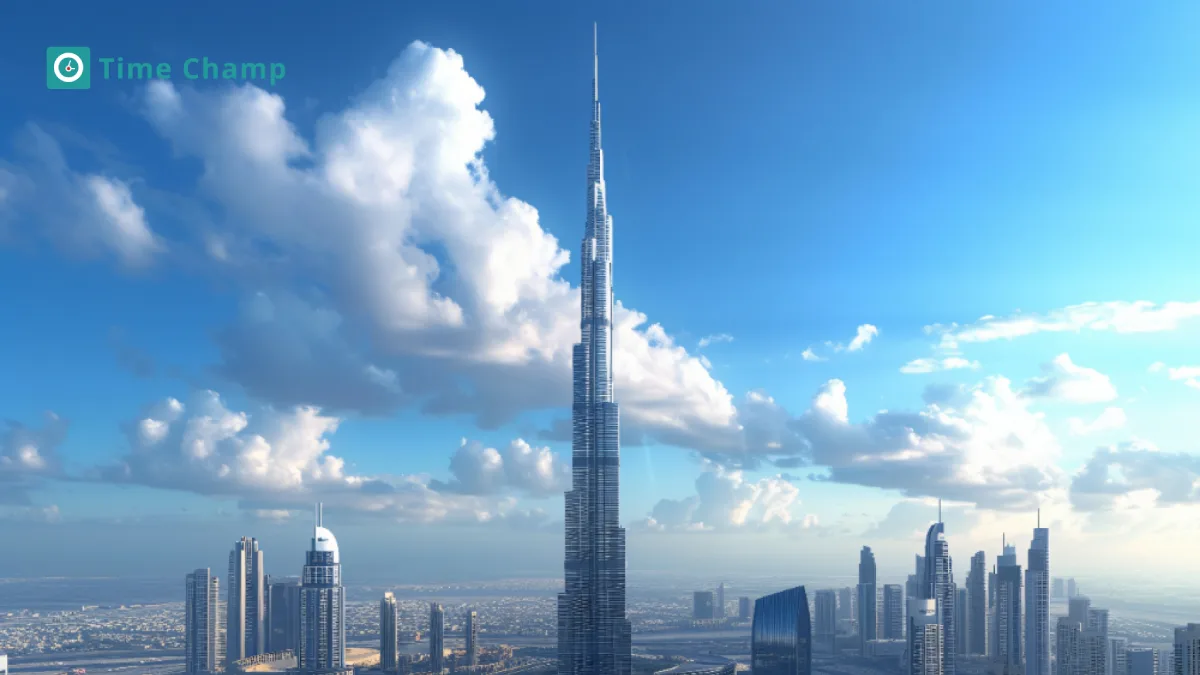The average salary in Dubai is 233,900 AED per year, approximately USD 63,700 making it a global talent attraction city. However, businesses dealing with Dubai face the challenge of striking a balance between salary expectations against the high cost of the city and the diversity that professional landscapes bring. Understanding these dynamics may help organizations attract and retain more talent. This article gives excellent insight into the salary structures in Dubai, which will help make the right decisions for firms.
What is the Average Salary in Dubai?
Average Salary in Dubai
The average annual salary in Dubai is about 233,900 AED (63,700 USD) and an average monthly salary of 19,491 AED (5306.55 USD). This figure reflects the overall mean of salaries within all kinds of industries and professions from the high-paid and highly specialized positions to the entry-level positions.
Median Salary in Dubai
The median monthly salary in Dubai is 13,800 AED (3757.19 USD). This has an added advantage that median measures are helpful as it states the middle wages which imply half of the people who work would have their wages lesser compared to the other half with a wage. The measure allows balanced estimations and the influences of extreme outliers that consist of extremely high and very low wages.
Minimum Salary in Dubai
There is no universal minimum wage in Dubai. Negotiations between employers and employees determine salaries with the support of labor laws that guarantee fair wages. The Wage Protection System protects the workers and ensures timely and full payment to skilled and unskilled workers.
Other Gulf Cooperation Council countries, for example, Saudi Arabia and Kuwait, implement minimum wage requirements for certain jobs, such as domestic workers; rather than a blanket policy. This policy makes a delicate balance between law protection and market-based negotiations.
What Factors Influence Salaries in Dubai?
Salaries in Dubai have similarities in how they have been influenced by factors such as experience, education, role, and location. These form factors that significantly contribute to earning potential differences across the different industries. Below is a detailed look at the key aspects affecting salaries in Dubai.
By Experience
Extensive experience has a huge difference in salaries in Dubai. Entry-level workers receive meager wages, but skilled professionals get progressive salaries. For example, those between 1-5 years of experience get 7% more than entry-level salary, and those above 20 years of experience take up to 29% more in their earnings.
By Education
Educational qualifications play a key role in salary scales in Dubai. High school graduates have 17% more salary compared to uneducated graduates. A diploma holder has 24% more salary than the previous ones. Bachelor’s degree holders have 29% more salary than the diploma holder. PhD holders have an extra 23% more than bachelor’s degree holders.
By City
Salaries in Dubai and the UAE depend upon location, driven by economic activity, industries, and living costs. The bigger cities like Dubai and Abu Dhabi will pay a competitively much better salary than in small cities. The average salary by location across the UAE is as follows:
| City | Average Annual Salary (AED) |
|---|---|
| Abu Dhabi | 253,400 |
| Ajman | 232,900 |
| Al Ain | 239,000 |
| Dubai | 257,700 |
| Fujairah | 216,800 |
| Ras Al Khaimah | 225,700 |
| Sharjah | 245,300 |
| Um Al Quiwain | 209,700 |
Source: Worldsalaries.com
By Profession
Salaries in Dubai are mainly affected by the nature of the profession one takes in, which means high in-demand and specialized fields mean higher remuneration. Doctors, lawyers, and engineers, among others, typically receive a higher wage and are higher because of what it entails and the importance of the industry. A list of general average salaries for different professions has been compiled below.
| Profession | Average Monthly Salary (AED) |
|---|---|
| Doctors | 21,500 |
| Software Engineers | 20,530 |
| IT Professionals | 18,400 |
| Investment Bankers | 16,600 |
| Pilots | 21,300 |
| Management Consultants | 13,450 |
| Lawyers | 21,270 |
| Dentists | 21,100 |
| Pharmacists | 12,100 |
| Labor | 2,600 |
| Accountant | 18,200 |
| Architect | 16,430 |
| Barber | 9,800 |
| Chef | 9,570 |
| Electrician | 4,500 |
| Fashion Designer | 17,210 |
| Financial Analyst | 19,216 |
| Firefighter | 16,300 |
| Graphic Designer | 16,800 |
| Human Resources Manager | 11,110 |
| Journalist | 20,900 |
| Judge | 21,500 |
| Marketing Manager | 18,300 |
| Nurse | 14,100 |
| Occupational Therapist | 12,540 |
| Painter | 4,000 |
| Police Officer | 9,800 |
| Real Estate Agent | 21,208 |
| School Teacher | 20,476 |
| Technical Writer | 19,160 |
Source: UAEboy.ae
What are the Highest-Paying Jobs in Dubai?
Dubai offers a very lucrative job opportunity globally, especially in leadership and specialized positions. Top-flight CEOs, financial experts, and highly skilled professionals top this list with salaries that reflect expertise and responsibility. Here are some of the highest-paying positions in Dubai:
| Profession | Monthly Salary (AED) |
|---|---|
| CEO | 415,745 |
| Digital Marketer | 14,000 |
| HR Manager | 144,700 |
| Doctor | 12,000 |
| Software Engineer | 11,000 |
| Chartered Accountant | 115,827 |
Source: Worldsalaries.com
What Benefits Do Employees in Dubai Receive?
Dubai is known for its wide benefits to employees. It attracts global talent by offering a competitive work environment in the city. Employees working in Dubai get various benefits that improve their professional and personal lives. Some of the main benefits of the employees are discussed below:
1. Mandatory Benefits
- Health Insurance: All employers must offer their employees a minimum level of health insurance. This includes Dubai Health Authority (DHA) requirements in Dubai, although treating dependents is not mandatory in the insurance plans.
- Annual Leave: After one year of work, employees have the right to 30 calendar days of leave per year. Public holidays are considered in addition.
- Sick Leave: Employees are allowed sick leave of up to 90 days in a year. It is broken down into 15 days on full pay, 30 days on half pay, and the rest unpaid.
- Maternity and Parental Leave: Female employees are eligible for 45 days of maternity leave (full pay if employed for over a year, half pay otherwise). Fathers receive five days of paid parental leave within six months of a child’s birth.
- Gratuity (End-of-Service Benefits): Employees receive gratuity as severance pay based on their tenure-21 days’ salary per year for the first five years and 30 days for subsequent years, capped at two years’ salary.
2. Additional Perks (Offered by Employers)
- Housing and Transport Allowances: Most employers offer compensation for expenses to cover living expenses hence expats are often entitled to a housing allowance.
- Annual Flight Tickets: A significant percentage of companies offer expatriates a yearly ticket home.
- Relocation Packages: To capture the best talents from around the world many companies offer to reimburse for the moving costs as well as visas, and temporary accommodations.
- Bonuses: Most commonly, a performance-based incentive plan is widely used, especially in industries with high competition levels such as finance and IT.
- Flexible Working Options: Currently, hybrid or remote work policies are becoming a trend to enhance the quality of the work-life balance.
3. Reforms and New Initiatives
The UAE introduced an enhanced End-of-Service Benefits System in 2024. This allows employees to invest their gratuity payments in savings and retirement plans with Sharia-compliant or risk-free choices, ensuring financial stability after service.
What is the Cost of Living in Dubai?
Dubai is one of the most expensive cities in the world for expats, and yet it has no income tax. The living cost is very high, especially for housing. Let’s dig deeper into the key expenses you should expect when living in Dubai.
| Expense Category | Average Monthly Cost (AED) | Details |
|---|---|---|
| Housing | 7,000-30,000 | 1BHK in suburbs: AED 7,000-10,000; 3BHK in city center: AED 15,000-30,000 |
| Utilities | 500-1,200 | Includes electricity, water, and cooling |
| Internet | 300-500 | High-speed broadband |
| Food | 1,400-2,700 | Groceries for a family: AED 1,400-2,700. A meal in a restaurant: AED 50-70. |
| Transportation | 300-500 | Monthly metro/bus pass; gas: AED 3-4 per liter. |
| Healthcare | 500-1,500 | Mandatory health insurance; private consultation fees extra. |
| Education (Private) | 30,000-100,000 (annual) | School fees depend on level and curriculum. |
| Entertainment | 1,000-2,500 | Dining, gym memberships, and leisure activities. |
Source: Numbeo
Is Dubai a Good Choice for Outsourcing Your Business?
Dubai as an outsourcing destination provides businesses with a perspective on increasing the efficiency of operations and reducing costs. Here are the key factors that make it an excellent outsourcing destination.
Strategic Location
Being between Europe, Asia, and Africa, Dubai will give a time zone advantage allowing easy management of operations throughout the world. It is also an ideal gateway for companies reaching the Middle East and North African markets.
Highly Skilled Workforce
Dubai attracts a diverse and multilingual workforce for companies, thus offering access to highly skilled talent in all sectors, from IT to customer support. This means that with access to top talent, there is quality service delivery at competitive rates.
Advanced Infrastructure
Dubai provides state-of-the-art IT infrastructure, robust telecommunication networks, and advanced facilities for an ideal business operations environment. Free zones such as Dubai Internet City augment the advantage of tech outsourcing through tax benefits and fewer hassles in the procedures.
Pro-Business Environment
Dubai is a pro-business place, with no corporate tax in many free zones, and has low tax policies in general. The regulatory environment here is compliant with international data protection and intellectual property laws, which create a business-friendly environment.
Which Industries are Most Commonly Outsourced to Dubai?
Dubai has become one of the important outsourcing destinations, meeting all forms of requirements in several industries. Here are some of the most commonly outsourced industries in the city, influenced by its excellent infrastructure, expertise, and location:
Logistics
Logistics in Dubai is the core driver of the UAE economy that is fueled by technological breakthroughs like RFID, GPS, and barcoding. CPFR (Collaborative Planning, Forecasting, and Replenishment) and VMI (Vendor Managed Inventory) are collaborative tools that ease operations. Port Jebel Ali has created an important transshipment hub from Europe to Asia for Europe-Asia trade, building its logistics footprint around the globe.
Manufacturing and Distribution
Manufacturing in the UAE is growing highly due to government policies to diversify the economy and reduce reliance on oil. The sector benefits Dubai’s strategic location, its infrastructure is highly advanced, and its low-tax environment. This growth attracts global investors to set up manufacturing and distribution facilities.
Construction and Real Estate
The construction and real estate sectors in Dubai are very dynamic and the most important in the world. Large projects such as Expo 2020 have increased demand, and outsourcing includes project management, risk analysis, and cost consultancy to cope with these market trends and ensure adherence to local regulations.
Business Process Outsourcing (BPO)
Global Business Process Outsourcing Market was estimated to be around USD 280.64 billion in the year 2023, but it is expected to continue its growth at 9.6% CAGR from 2024 to 2030. BPO deals with outsourcing several business activities from services like customer support and data management to financial services to outside providers. Dubai’s infrastructure quality workforce and strategic positioning establish it as a strong center for BPO operations by serving the IT and financial sectors, e-commerce ventures, and others.
Conclusion
Dubai offers competitive salaries across the globe because of the city’s reputation as an economic global center. Salaries vary from profession, education level, and years of experience. However, Dubai has a tax-free income and a strong support system that encourages professionals across the world to work. For business people, strategic location and expertise make this city ideal for outsourcing to other destinations. Dubai will continue to grow and become one of the great destinations for professional advancement and investment opportunities that can balance financial prospects with a great standard of living.
Frequently Asked Questions
A good salary in Dubai is in the range of AED 18,000 to AED 30,000, which equals around USD 4,900 to 8,168. Such an amount of salary allows for comfort in expenses that cover such basic spending items as housing, transportation, food, and entertainment and for savings depending on individual desires.
A salary of 5,000 AED per month can be challenging for a comfortable lifestyle in Dubai, as the city has relatively high living costs, especially for housing and utilities. It is sufficient to spend for an individual having shared accommodation and staying modestly, but it cannot be affordable for families and those requiring high financial commitments.
Costs in Dubai are pretty pricey, including the cost of housing, schooling, and healthcare. Monthly expenses go according to lifestyle; however, as far as single individuals are concerned, starting from AED 9,000, excluding rent. Families would cost much higher depending on how much one would need for their house or their schooling requirements, and thus it lacks income tax; that partly makes up for costs.







